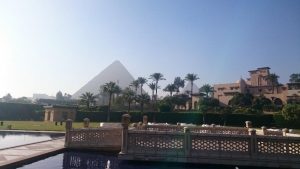(Written by research associate of Reading Classics, Dr Hana Navratilova.)
The International Congress of Egyptologists 2019 took place in Cairo, where it returned after nearly 20 years. It is a regular occurrence of every four years. This time the meetings took place in one of Cairo’s historic hotels, the Mena House, a place of wartime meetings of the Allied leaders in the 1940s – and with a direct view of the pyramids. However, the programme was both attentive to historical roots, reflected in the conference venue surroundings, and very outward- and forward looking, and as it encompassed several hundred papers of scholars from all over the world, concerned with all historical periods of Egypt between early dynastic to late Antiquity and a rich variety of methodologies. Graeco-Roman Egypt was also represented, as was history of Egyptology and Oriental Studies. One might have wished for even more interdisciplinary papers showcasing the character of modern studies of ancient Egypt, but, truth be said, a full week of intense papers could not have been much extended.
As one of the session chairs, I had the opportunity to appreciate the diversity and depth of ongoing research projects. The afternoon text and languages session on Monday, 4th of November offered a rich outline of ongoing work in Egyptological philology, linguistics, text editing and text materiality. The trends included diversity of approaches, methodological openness and contextualisation. We also discussed the teaching of Greek and Latin versus teaching of ancient Egyptian!


